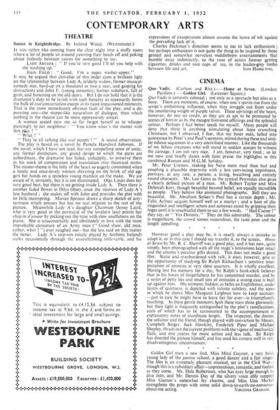CONTEMPORARY ARTS
THEATRE
Sunset in Knightsbridge. By Ireland Wood. (Westminster.)
IT was rather like coming from the clear night into a stuffy room where a lot of people sit around yawning their heads off and poking about listlessly between yawns for something to say.
LADY ARCHER : " If you're very good I'll let you help with the washing up."
JOHN FIELD: " Good. I'm a super washer-upper."
It may be argued that chit-chat of this order casts .a brilliant light on the relationship between Lady A. (elderly widow, former musical- comedy star, hard-up on a thousand or two a year, and gasping for distraction) and John F. (young nonentity, former subaltern, full of gush, and battening on the old dear). But I do not hold that it is \the dramatist's duty to be lavish with such banality as necessarily forms the bulk of real conversation except in its more impassioned moments. That is the most immediately obvious fault of the play, and a de- pressing one—the steppe-like naturalism of dialogue, than which nothing in the theatre can be more oppressively unreal.
A woman seated near me so far forgot herself as to whisper piercingly to her neighbour : " You know what's the matter with this play? "
" What ? "
" They're all talking like real people ! " A sound observation.
The play is based on a novel by Pamela Hansford Johnson. If the novel, which I have not read, has any compelling sense of unity, any formal distinction, any grand design to which the parts are subordinate, the dramatist has failed, unhappily, to preserve them in his work of compression and translation into theatrical terms. The master-theme is the folly of the heart so eagerly committed when a lonely and once-lovely women shivering on the brink of old age gets her hands on a spineless young manikin on the make. We are aware of it, certainly, but it is not illuminated. Olga Lindo does her very good best, but there is no getting inside Lady A. Then there is another faded flower in Dilys Olney, once the mistress of Lady A's late husband ; she makes off with John and provides the plot with its little mainspring. Marian Spencer draws a sharp sketch of arty- tartiness which amuses but has no real relation to the rest of the picture. Meanwhile Lady A's daughter Charmian (Jenny Laird, who is very good at the portrayal of the lovelorn lass) points her chagrin d'amour by picking out the tune with slow soulfulness on the piano. She is unaccountably and obstinately in love with the most improbable caricature of an Army man (" Good show, old man, rather, what ! ") ever roughed out—but the less said on this matter the better. Lady A's step-son (nicely played by Anthony Ireland) stalks occasionally through the anaesthetising tittle-tattle, and his expressions of exasperation almost assume the lustre of wit against the prevailing lack of it.
Charles Hickman's direction seems to me to lack enthusiasm ; but perhaps enthusiasm is not quite the thing to be inspired by those genteel and somewhat nerveless middlebrow entertainments that bumble Away indistinctly, to the tune of actors forever getting cigarettes, drinks and nice cups of tea, in the leaden-grey limbo


































 Previous page
Previous page